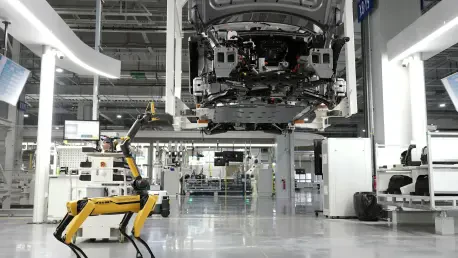In a transformative move that has sent ripples through the technology and industrial sectors, SoftBank Group Corp. has secured a monumental $5.4 billion acquisition of ABB Ltd.’s global robotics business, with the announcement made on October 8 of this year. This deal, anticipated to conclude by mid-to-late 2026 subject to regulatory clearances, cements SoftBank’s ambition to lead in the innovative realm of “Physical AI,” a pioneering concept that merges cutting-edge artificial intelligence with tangible robotic systems. Far beyond a simple corporate transaction, this acquisition signals a profound shift toward intelligent automation, poised to redefine operations across critical industries such as manufacturing, logistics, and healthcare. With ABB’s established robotics division—boasting 7,000 employees, major manufacturing facilities in China, the US, and Sweden, and revenues of $2.3 billion in the prior year—SoftBank gains an immediate foothold in a competitive landscape. This strategic leap bypasses the slow grind of organic growth, positioning the company to drive a future where autonomous machines could become integral to daily life, much like digital devices are today. The implications of this deal extend beyond business, touching on societal, economic, and technological paradigms that are only beginning to emerge.
Redefining Automation with Physical AI
The core of SoftBank’s strategy lies in the groundbreaking idea of “Physical AI,” which seeks to integrate advanced AI software with robust robotic hardware to create systems that transcend traditional automation. Unlike older models of robotics that operate on fixed, pre-programmed instructions, Physical AI envisions machines capable of learning, adapting, and making autonomous decisions in real-time scenarios. Leveraging ABB’s reputation for precision-engineered robots, SoftBank aims to develop technology that can handle intricate tasks in dynamic, unpredictable environments. This vision moves robotics out of the controlled confines of industrial settings and into broader applications, potentially transforming sectors with demands for flexibility and intelligence. The ambition is to create robots that don’t just perform repetitive functions but interact with the world in a nuanced, almost human-like manner, opening doors to innovations previously thought to be the stuff of science fiction.
This push into Physical AI isn’t without its challenges, as industry analysts have pointed out. Integrating SoftBank’s expertise in AI with ABB’s established hardware requires not just technical alignment but also a melding of distinct corporate cultures and operational philosophies. Success in this endeavor could set a new benchmark for what robots can achieve, from sorting packages with unparalleled dexterity in logistics hubs to assisting in delicate medical procedures. However, the road ahead demands overcoming significant hurdles, including ensuring safety in human-robot interactions and refining AI algorithms to handle the chaos of real-world environments. The cautious optimism surrounding this vision reflects both the immense potential and the complex realities of bringing such advanced technology to fruition.
Technological Convergence and Industry Trends
The acquisition of ABB’s robotics arm by SoftBank underscores a pivotal trend in technology: the convergence of AI, the Internet of Things (IoT), and advanced manufacturing systems. This integration marks a departure from viewing robots as isolated tools, instead positioning them as vital components of intelligent, interconnected ecosystems. With data-driven insights fueling physical operations, the potential emerges for fully autonomous factories, smart urban infrastructures, and even optimized personal spaces. SoftBank’s move amplifies this shift, suggesting a near future where AI doesn’t merely support but actively drives physical processes, streamlining everything from production lines to city-wide resource management. This trend points to a maturation of robotics from niche industrial applications to a pervasive force across multiple domains.
Beyond the promise of efficiency, this technological convergence raises critical questions that demand attention. As AI-powered systems become embedded in everyday operations, concerns about data privacy, cybersecurity, and the ethical deployment of such potent tools come to the forefront. How will society balance the benefits of smarter systems against the risks of over-reliance or misuse? The implications of interconnected robotics extend into regulatory realms, where frameworks must evolve to address the unique challenges posed by autonomous machines. SoftBank’s acquisition serves as a catalyst for these discussions, highlighting the need for proactive measures to ensure that technological advancements align with societal well-being and security, rather than outpacing them.
Reshaping the Competitive Landscape
SoftBank’s bold acquisition redraws the competitive boundaries within the robotics and AI industries, establishing the company as a formidable player capable of delivering comprehensive solutions. By merging ABB’s industrial-grade hardware with its own AI investments—such as stakes in chip technology through Arm Holdings—SoftBank gains a unique edge over rivals. This positions the company to challenge tech giants like Google and Amazon, who are also expanding into robotics, while putting pressure on traditional robotics manufacturers lacking robust AI capabilities. The immediate access to ABB’s global infrastructure and customer base offers SoftBank a significant head start, bypassing the lengthy process of building such assets from scratch. This strategic advantage could redefine market standards, prioritizing integrated systems over standalone products.
However, the true measure of success lies in translating this acquisition into groundbreaking innovations rather than merely expanding market presence. Competitors are on notice: adaptation to the era of intelligent automation is no longer optional. Traditional firms must accelerate their AI integration to remain relevant, while smaller companies specializing in niche areas like sensor technology or AI software could find lucrative opportunities as collaborators in SoftBank’s expanding ecosystem. The competitive shake-up extends beyond direct rivals, influencing supply chains and partnerships across the sector. As SoftBank sets its sights on leading the Physical AI revolution, the industry watches closely to see if this merger will yield the transformative products promised or face integration challenges that could stall progress.
Economic and Societal Implications
The broader impact of SoftBank’s acquisition on the economy and society cannot be overstated, as it heralds a new era of intelligent automation with both promising and challenging outcomes. On one hand, the potential for significant productivity gains across industries like manufacturing and logistics is immense, potentially reducing costs and enhancing output on a global scale. New job categories, such as roles in AI development and robot oversight, are likely to emerge, offering fresh opportunities for skilled workers. Additionally, the environmental benefits of AI-driven robotics could be substantial, with optimized processes in various sectors reducing waste and improving energy efficiency, aligning with pressing sustainability goals. This acquisition could thus serve as a catalyst for positive transformation, reshaping economic models for the better.
On the flip side, the societal challenges posed by this shift are equally significant and require careful consideration. The risk of job displacement looms large, as automation threatens to replace human labor in numerous fields, necessitating robust policies to support workforce retraining and transition. Ethical concerns also arise, particularly regarding the accountability of increasingly autonomous systems—ensuring safety and preventing misuse become paramount as robots integrate into daily life. Regulatory bodies face the task of crafting guidelines that keep pace with rapid technological change, balancing innovation with public interest. SoftBank’s move into Physical AI amplifies these discussions, urging stakeholders to address the dual nature of progress: immense potential paired with the responsibility to mitigate its unintended consequences.
Future Horizons in Intelligent Automation
Looking ahead, SoftBank’s immediate focus following the acquisition will likely center on integrating ABB’s hardware with its AI capabilities over the next few years. This process will involve substantial research and development to embed sophisticated algorithms and perception technologies into existing robotic systems, potentially leading to new product unveilings in sectors like logistics, construction, and healthcare. The timeline for tangible results may span from the current year to 2027, with early innovations expected to target specific industrial pain points before expanding into broader applications. If successful, these efforts could position SoftBank as a pioneer in creating robots that operate seamlessly in unstructured environments, fundamentally altering how industries function on a day-to-day basis.
Longer-term projections, extending beyond the next three years, paint a picture of even more ambitious applications for Physical AI. Experts anticipate expansions into smart cities, where robots manage infrastructure, as well as agriculture and fully autonomous warehouses. However, realizing this vision hinges on overcoming persistent challenges, such as refining human-robot interaction for safety and navigating complex regulatory landscapes across different regions. The acquisition is also likely to spark increased investment in related startups, focusing on specialized components like advanced grippers or locomotion systems. As SoftBank drives forward, the ripple effects of this deal could inspire a wave of innovation, provided the integration of ABB’s engineering excellence with cutting-edge AI vision achieves the synergy envisioned.
Reflecting on a Transformative Milestone
Reflecting on the events surrounding SoftBank’s $5.4 billion acquisition of ABB’s robotics business, it becomes clear that this transaction marks a defining moment in the journey toward intelligent automation. Announced earlier this year, the deal positioned SoftBank at the forefront of the Physical AI movement, blending advanced software with proven hardware to push the boundaries of what machines can achieve. The strategic importance of gaining ABB’s global infrastructure, alongside the competitive and societal shifts it triggered, underscores the profound impact of this move across multiple dimensions. As discussions unfolded about integration challenges and economic implications, the industry took note of the delicate balance between innovation and responsibility that shaped the narrative. Moving forward, the focus must shift to actionable strategies—prioritizing research to overcome technical barriers, fostering partnerships to enhance capabilities, and engaging with policymakers to build frameworks that ensure safe, equitable deployment of autonomous systems. This milestone serves as a reminder that while the path to a future dominated by intelligent robotics holds immense promise, it demands a collaborative, thoughtful approach to truly benefit society on a global scale.









